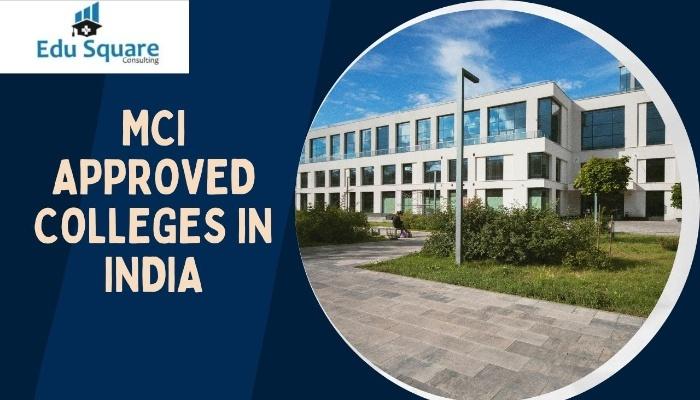Types of MCI-Approved Colleges You Can Choose for MBBS

Choosing the right medical college is one of the most crucial decisions in the life of any aspiring doctor. For students in India, especially those aiming for a globally recognized medical degree, the term “MCI Approved Colleges in India” holds immense importance. The Medical Council of India (MCI), now succeeded by the National Medical Commission (NMC), has been the governing body responsible for maintaining the quality and standards of medical education in the country.
At Edusquare Consulting, our mission is to help students navigate the complex process of medical admissions—whether in India or abroad—and guide them toward recognized, reputable institutions.
Why MCI Approval Matters
Choosing from MCI-approved colleges in India is not just about prestige; it’s about career security and quality education. Here’s why it matters so much:
a. Legal Recognition
Only MCI-approved (or NMC-recognized) colleges can award valid medical degrees in India. Without this approval, a degree is not recognized, meaning graduates cannot register as doctors or practice legally.
b. Quality Education
MCI approval signifies adherence to stringent educational standards, ensuring that the curriculum, faculty, and facilities are adequate for producing competent doctors.
c. Eligibility for Licensing Exams
Graduates from MCI-approved colleges are eligible to appear for licensing exams such as NEXT (National Exit Test) or foreign licensing exams like USMLE, PLAB, and FMGE.
d. Global Recognition
Degrees from MCI-approved institutions carry greater value internationally, helping students pursue postgraduate studies or careers abroad.
e. Ethical and Professional Standards
MCI regulations ensure that medical colleges follow ethical practices in teaching, research, and patient care—key aspects of a holistic medical education.
Categories of MCI-Approved Colleges in India
India has one of the world’s largest networks of medical institutions. As of now, over 650 MCI-approved medical colleges are offering MBBS courses across various states and union territories. These can be broadly divided into three categories:
1. Government Medical Colleges
These are state-funded and managed by central or state governments. They usually have lower tuition fees, high patient inflow, and excellent infrastructure. Examples include:
-
All India Institute of Medical Sciences (AIIMS), New Delhi
-
Maulana Azad Medical College (MAMC), Delhi
-
Grant Medical College, Mumbai
-
Madras Medical College, Chennai
-
King George’s Medical University (KGMU), Lucknow
2. Private Medical Colleges
Privately managed institutions offer high-quality education, but they typically have higher fees. Many are affiliated with reputed hospitals. Examples include:
-
Kasturba Medical College (KMC), Manipal
-
Christian Medical College (CMC), Vellore
-
Sri Ramachandra Institute of Higher Education and Research, Chennai
-
Amrita School of Medicine, Kochi
-
Jawaharlal Nehru Medical College, Belgaum
3. Deemed Universities
These are autonomous institutions granted “deemed-to-be-university” status by the UGC and recognized by MCI/NMC. They design their own curriculum while following national standards. Examples include:
-
SRM Institute of Science and Technology, Chennai
-
Bharati Vidyapeeth Deemed University, Pune
-
Saveetha Institute of Medical and Technical Sciences, Chennai
Admission Process in MCI-Approved Colleges in India
Admission to MCI-approved medical colleges in India is primarily through the National Eligibility cum Entrance Test (NEET-UG), conducted by the National Testing Agency (NTA).
a. Eligibility Criteria
-
The candidate must have completed 10+2 with Physics, Chemistry, Biology, and English.
-
Minimum aggregate marks: 50% for the general category and 40% for SC/ST/OBC.
-
The candidate must qualify for NEET with the required percentile (50th percentile for general, 40th for reserved categories).
b. NEET Counseling Process
-
All India Quota (AIQ) – 15% of seats in government colleges are filled through centralized counseling by the Medical Counseling Committee (MCC).
-
State Quota – 85% of government college seats and private college seats are filled through state-level counseling authorities.
-
Deemed Universities and Private Institutions – These conduct their own counseling under MCC supervision.
c. Documents Required
-
NEET Admit Card and Scorecard
-
Class 10 & 12 mark sheets
-
Caste/Category certificate (if applicable)
-
Domicile certificate
-
Identity proof
Edusquare Consulting provides expert guidance to students throughout this process, ensuring they choose the best-fit college based on merit, preferences, and budget.
How Edusquare Consulting Helps Students
At Edusquare Consulting, we understand that choosing the right medical college can be overwhelming. From navigating NEET counseling to evaluating MCI-approved colleges in India, our expert counselors guide students every step of the way.
Our Services Include:
-
Personalized counseling sessions.
-
College selection based on merit, location, and budget.
-
Application and document assistance.
-
Guidance for NEET counseling and seat allotment.
-
Admission support for both Indian and overseas medical universities.
-
Post-admission support, including visa and travel assistance (for abroad options).
Conclusion
The journey to becoming a doctor begins with choosing the right medical college. With over 650 MCI-approved colleges in India, students have a wide array of options—each offering unique opportunities for learning, research, and service.
At Edusquare Consulting, we are committed to guiding students toward these top institutions with transparency, professionalism, and care. From understanding eligibility and preparing for NEET to choosing the right college, our team ensures a seamless journey toward your goal of becoming a doctor.







